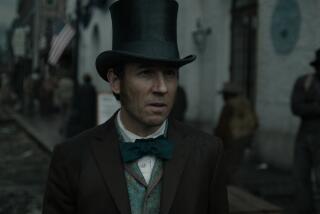Review: ‘Kill the Messenger’ a cautionary tale for crusading reporters
The key moment in “Kill the Messenger” takes place when imprisoned drug lord Norwin Meneses, suavely played by Andy Garcia, turns to Jeremy Renner’s crusading journalist, Gary Webb, and asks a deceptively simple question: “Now that you know the truth, you’re faced with the most important decision of your life: whether to share it.”
To San Jose Mercury News reporter Webb, who’s spent his entire career believing in the value of searching for and then fearlessly reporting the truth, that query is a nonstarter. He doesn’t yet believe what he’s later told, that some stories are just too true to tell, that the truth may set you free but it can also ruin your life.
The story Webb related in a series of articles he wrote for the Mercury News in 1996 under the headline “Dark Alliance” told a still-controversial tale that many people did not want to hear: that elements in the CIA made common cause with Central American drug dealers and that money that resulted from cocaine sales in the U.S. was used to arm the anti-communist Contras in Nicaragua. Although the CIA itself confirmed, albeit years later, that this connection did in fact exist, journalists continue to argue about whether aspects of Webb’s stories overreached.
Made with the cooperation and support of Webb’s family, “Kill the Messenger” is very much in the journalist’s corner. As directed by Michael Cuesta (best known as one of the producer-directors of “Homeland”) from a screenplay by Peter Landesman, this pulpy, energetic film is a fast-moving and entertaining tale. It simultaneously applauds the nerve needed to take on the establishment and warns against the fierce vengeance those in power will take if you embarrass them and tread on their toes.
“Messenger” is strongest when it deals with Webb’s passion for the truth and his unstoppable quest to get the story and less compelling when it takes time out to demonstrate how all this affected his wife and children.
From beginning to end, however, the film is the beneficiary of a confident, convincing performance by Renner. He inhabits the character completely, digging into the role with the same won’t-let-go fierceness Webb himself displayed when newsworthy information came his way.
The story that changed Webb’s life began when he got a call from flirtatious Coral Baca (Spanish actress Paz Vega), who tells him that her incarcerated boyfriend was selling drugs for the government and she has the leaked grand jury testimony to prove it.
That revelation leads to surreal conversations with imprisoned drug dealer “Freeway” Ricky Ross (Michael Kenneth Williams, “The Wire’s” Omar) and his attorney (Tim Blake Nelson) that include sentiments like “national security and crack cocaine in the same sentence, doesn’t that seem strange to you?”
It certainly seems strange to Webb, who gets the approval of cautious editor Anna Simons (Mary Elizabeth Winstead) to pursue the lead, which leads him to that conversation with Meneses in a Nicaraguan prison.
Intercut with this enterprise reporting is Webb’s relationship with his loving family, including wife Sue (Rosemarie DeWitt) and his three children. Though tensions within the group are evident and play out in the second half of the film, these interactions are inevitably weak and generic compared to the thrill of the journalistic chase.
When the Mercury News publishes the “Dark Alliance” story in August 1996, it explodes like the bombshell that journalists like Webb hope for their entire lives. But in this case, the explosion damaged Webb more than anyone else.
For what no one counted on was that the journalistic establishment — including elite newspapers such as the Los Angeles Times — would attempt to discredit Webb’s reporting.
The other newspapers questioned the shakier parts of his story and proving the truth of what one of Webb’s sources tells him: “You get the most flak when you’re right above the target.” As then-Washington Post ombudsman Geneva Overholser wrote at the time, her newspaper had “shown more passion for sniffing out the flaws in the Mercury News’ answer than sniffing out a better answer themselves.”
In over his head in ways he never anticipated, Webb became a journalistic pariah for telling the story he so believed in. As its title indicates, “Kill the Messenger” is a cautionary tale, but for crusading journalists, keeping themselves safe from Gary Webb’s fate may be easier said than done.
Twitter: @KennethTuran
-------------------------------
‘Kill the Messenger’
MPAA rating: R for language, drug content
Running time: 1 hour, 52 minutes
Playing: In general release
More to Read
Only good movies
Get the Indie Focus newsletter, Mark Olsen's weekly guide to the world of cinema.
You may occasionally receive promotional content from the Los Angeles Times.







